Digital Nomad Guide to Zanzibar: BRUTALLY Honest Review
Zanzibar is paradise. It’s the perfect escape if you’re after a beach vacation or winter getaway. If you’re working online, you might be considering a tropical island to call your office. As someone who’s worked from this island for two weeks now, I’ve discovered a few things you should keep in mind before making any decisions. This digital nomad guide to Zanzibar will walk you through everything you need to know, so let’s get started!
Getting to Zanzibar
The two most common ways to get to and from Zanzibar are by ferry or flying directly to the island. If you can get a flight right to Zanzibar, do it! While it may be a little more expensive than the ferry, it will save you time and the mental exhaustion that comes with navigating the ferry with all your belongings (especially if you’re travelling solo).
If you’re choosing to take the ferry it’s $30 USD for economy tickets but you need to arrive at least 1.5 hours early to secure a ticket, otherwise, you’ll have to pay $40 USD + for business class.
Zanzibar Pros & Cons

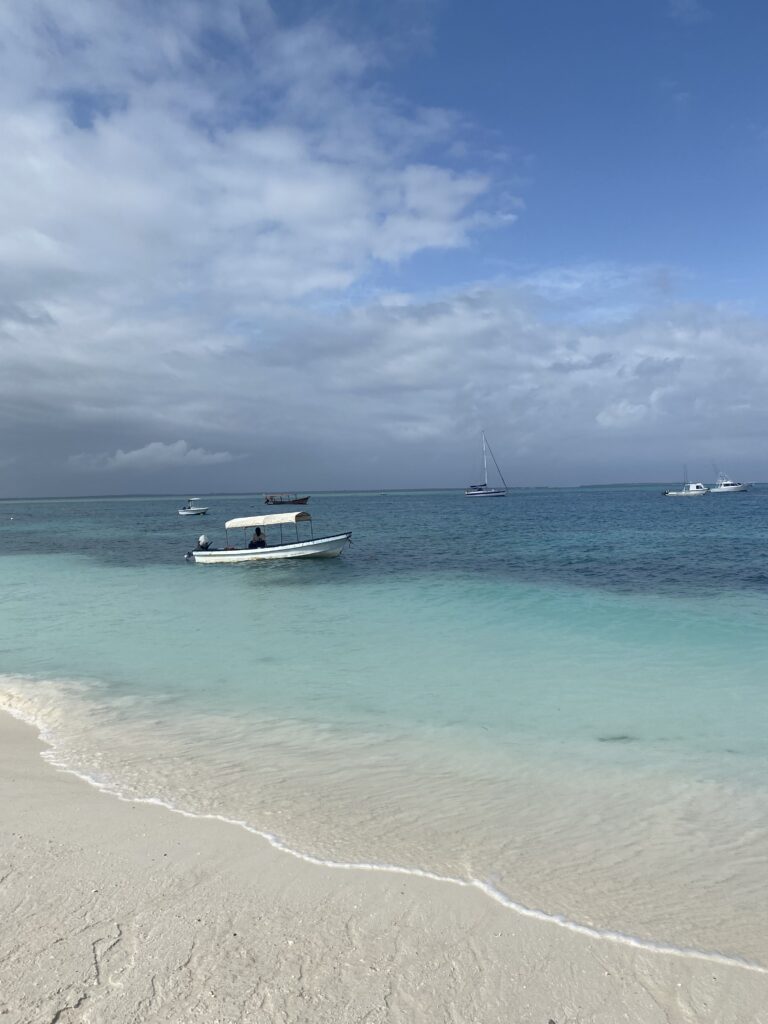
Zanzibar is an idyllic island off the coast of Tanzania.
It’s safe to say it’s a dream destination for digital nomads seeking a balance of work and relaxation. Surrounded by the turquoise waters of the Indian Ocean, the island offers stunning beaches, a rich cultural heritage, and a laid-back lifestyle.
Pros
- Affordable Cost of Living: Accommodation, food, and transportation are budget-friendly, making it an attractive option for long-term stays.
- Natural Beauty: With pristine beaches, coral reefs, and lush spice farms, Zanzibar is perfect for nature lovers.
- Cultural Experience: The island’s unique blend of Swahili, Arab, and Indian influences is evident in its architecture, cuisine, and traditions, providing endless opportunities to learn and explore.
- Growing Digital Nomad Community: Zanzibar is becoming increasingly popular among remote workers, offering networking opportunities and coworking spaces.
Cons
- Unreliable Internet: While some accommodations and coworking spaces have decent Wi-Fi, connectivity can be inconsistent in certain areas.
- Limited Infrastructure: Power outages and water shortages can occasionally disrupt daily routines.
- Isolation: While the island is serene, some nomads may feel disconnected from larger cities or hubs. Travelling to other parts of Africa is certainly possible but takes more time and money to do so.
Despite its challenges, Zanzibar’s charm and tranquility make it a top choice for remote workers craving an off-the-beaten-path adventure.
Best Time to Visit Zanzibar
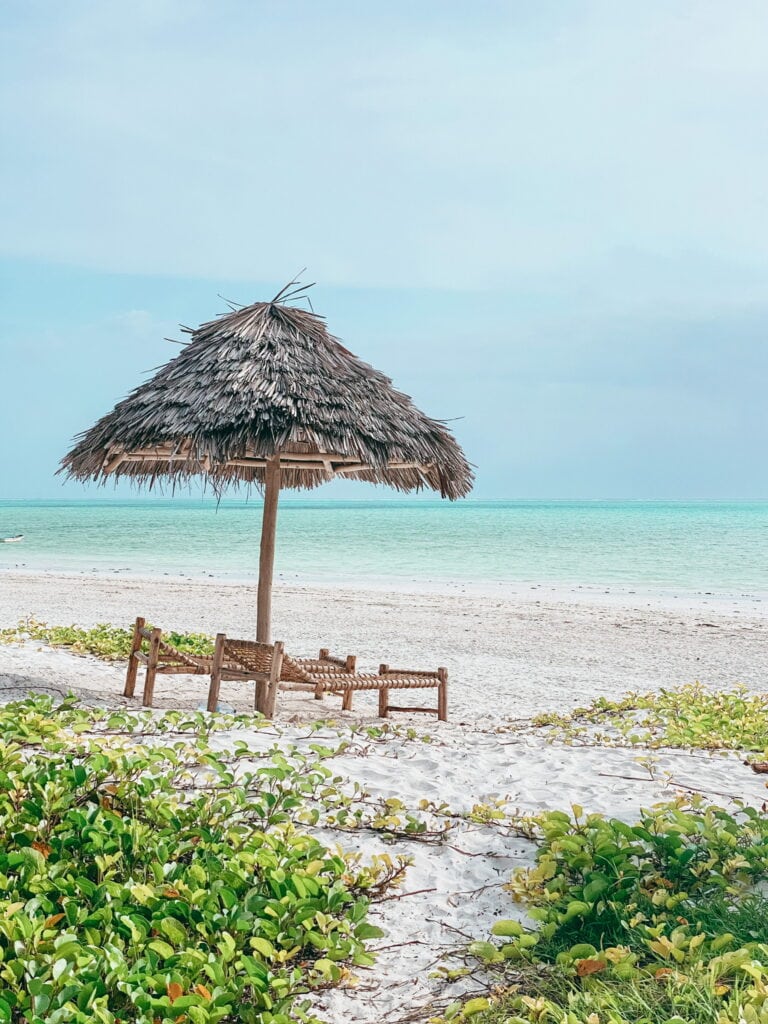
One of the most important things to take away from this digital nomad guide to Zanzibar is the best time to visit!
While Zanzibar is a year-round destination, the best time to visit depends on your preferences for weather, activities, and experiences.
The dry season is from June to October.
This time is ideal for those seeking perfect beach weather, with warm, sunny days and lower humidity. This period also coincides with winter in the Northern Hemisphere, making Zanzibar a popular escape for those looking to escape colder weather.
For marine enthusiasts, the months of July to September have great conditions for diving and snorkelling. This is when calm seas and clear visibility reveal vibrant coral reefs and diverse marine life!
December to February is another popular time, offering hot, dry weather. It’s perfect for soaking up the sun and enjoying water-based activities, though it can be busier and pricier due to holiday season demand. I personally visited in February and while it’s said to be ‘dry’, it’s still very humid, with temperatures over 30°C most days.
The rainy season is from March to May and November.
This bring fewer crowds and lower prices. While heavy rains can disrupt outdoor plans, the lush greenery and quieter beaches make it an appealing option for those looking for a good deal!
Where to Stay in Zanzibar: Top Zanzibar Destinations
Zanzibar offers diverse options for accommodation, catering to every traveller’s style.
Here are the top destinations to consider:
- Stone Town – Stone Town is probably the busiest part of the island and where many locals live. Stay here if you want to immerse yourself in the island’s cultural heritage and enjoy easy access to attractions like the Forodhani Gardens and House of Wonders. Keep in mind that Stone Town isn’t close to the picture-perfect beaches you imagine when you think of Zanzibar!
- Paje – On the east coast, Paje is a haven for kite surfers and digital nomads. Its laid-back atmosphere, budget-friendly accommodations, and coworking spaces attract a young, adventurous crowd. It’s where I met the most number of digital nomads when I was there.
- Nungwi – Located at the northern tip of the island, Nungwi is famous for its white sandy beaches and lively atmosphere. It’s a hub for water activities like snorkelling, diving, and sunset cruises. With plenty of resorts, restaurants, and bars, it’s perfect if you want more action.
- Kendwa – Just south of Nungwi, Kendwa offers similar stunning beaches but with a more relaxed vibe. Known for its full-moon parties and calm waters, it’s ideal for those wanting a balance of a chill vibe with fun nightlife.
- Jambiani – Neighbouring Paje, Jambiani is a quieter escape. With charming guesthouses and local eateries, it’s perfect if you’re seeking authenticity and serenity.
Living in Zanzibar
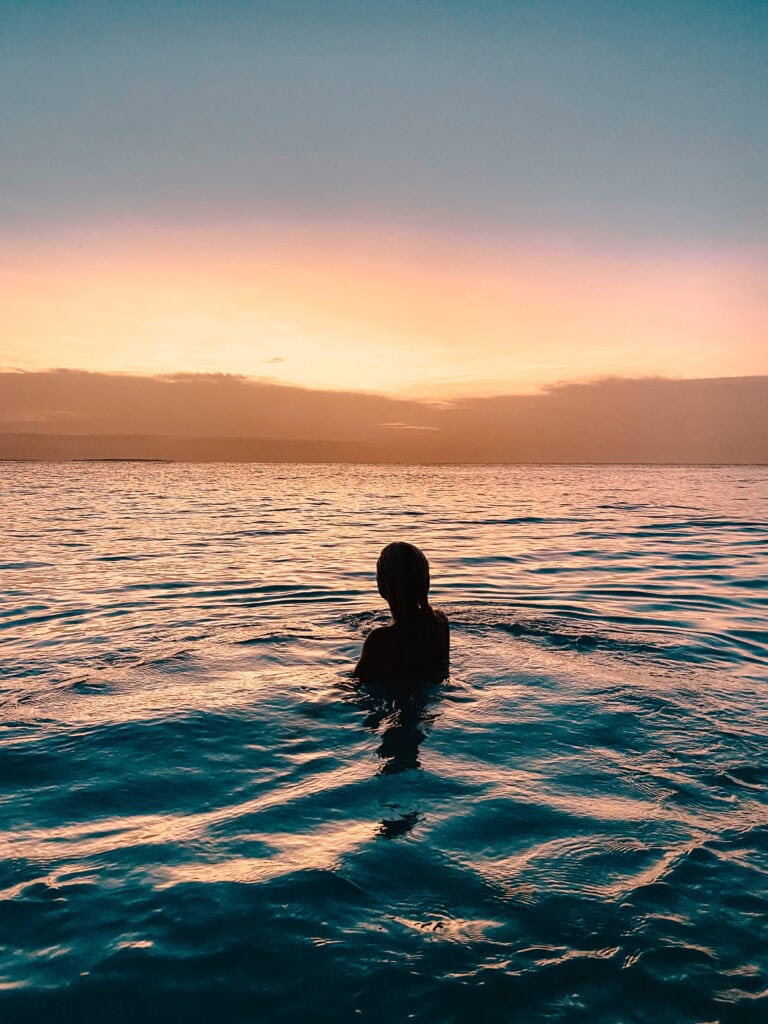
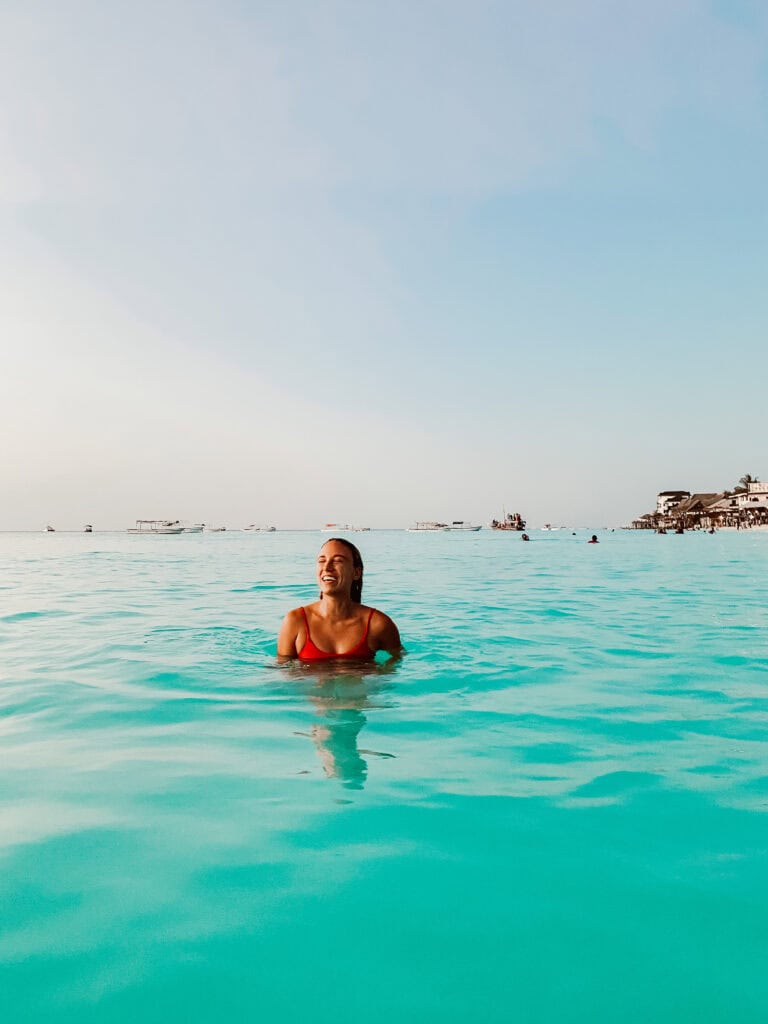
Living in Zanzibar offers a unique blend of affordability, stunning natural beauty, and cultural immersion. However, there are important factors to consider when planning a long-term stay.
Cost of Living
Zanzibar is budget-friendly compared to many digital nomad hotspots.
Monthly expenses for accommodation can range from $300 for a basic guesthouse or shared apartment to $1,000+ for a luxury villa.
Meals are affordable, with local dishes at street stalls costing around $2-$5, while mid-range restaurants charge $10-$20 per meal.
Transportation via dala-dala (local minibusses) is extremely cheap, but hiring a scooter or car may be more convenient, costing $50-$100 per month for a scooter rental.
Connectivity
Internet connectivity in Zanzibar can be inconsistent.
While cafes, coworking spaces, and resorts in areas like Stone Town, Paje, and Nungwi often provide reliable Wi-Fi, speeds may not always support heavy workloads or video calls.
Investing in a local SIM card with data from providers like Zantel or Vodacom is by far the BEST way to stay connected.
Essentials
Basic necessities such as groceries, toiletries, and fresh produce are readily available in local markets.
Power outages and water shortages can occasionally occur, so it’s wise to have a backup power bank and bottled water on hand.
Despite these challenges, the island’s charm makes it a rewarding place to live.
Finding Long Term Accommodation in Zanzibar
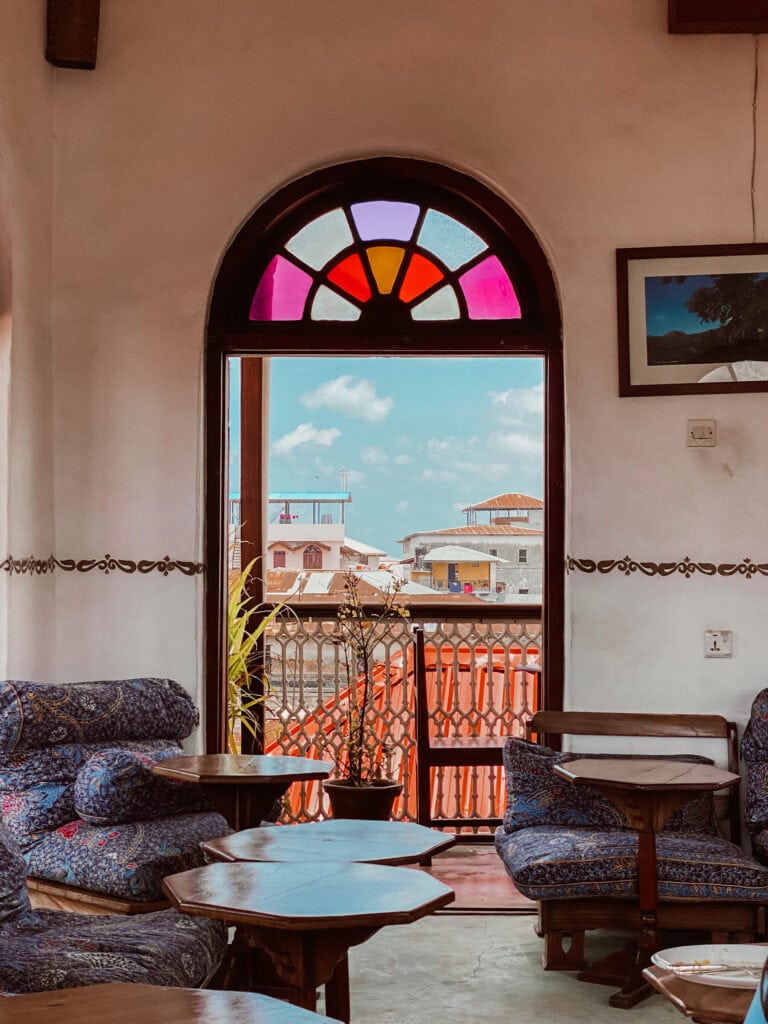
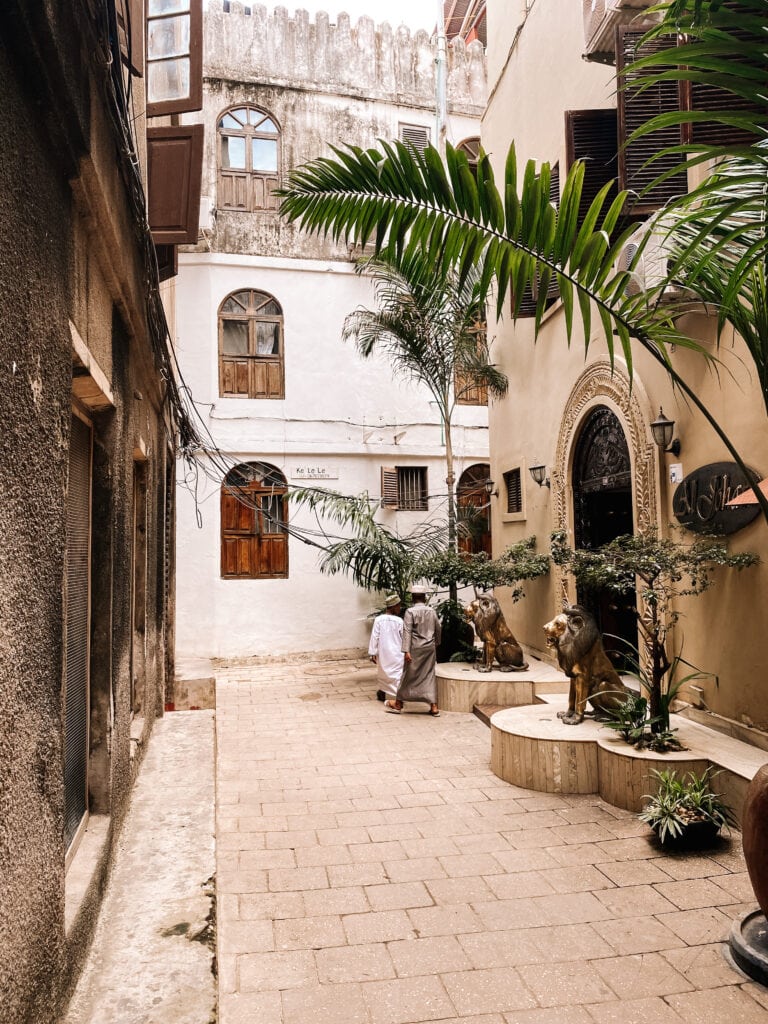
When considering working abroad in Zanzibar, you need to consider accommodation. From my experience, there aren’t many great options for budget accommodation. You can find hostels in popular areas such as Paje and Nungwi where shared rooms start at around $20 USD per night.
If a hostel isn’t your speed, you can expect to pay around $30-35 USD per night for a guest house or small Airbnb. Airbnb would be the best option if you’re planning to come to Zanzibar with a group of friends who are also working remotely.
Where to Look
Airbnb and Booking.com are great starting points, often offering discounts for monthly stays.
Facebook groups such as “Zanzibar Expats & Locals” or “Zanzibar Housing” can connect you directly with landlords and other long-term renters.
If you’re already on the island, word-of-mouth and local contacts can help you discover hidden gems that might not be listed online.
Cost of Shared Apartments
Shared apartments in Zanzibar typically cost between $200 and $500 per month, depending on the location and amenities.
Stone Town and Paje are popular among digital nomads and offer a range of affordable shared housing. These prices usually include utilities like water and electricity but may not cover Wi-Fi, which you’ll need to arrange separately.
Private Options
For those seeking more privacy, private apartments or beachfront bungalows start around $400 and can go up to $1,500+ per month for luxury properties.
Negotiate directly with property owners to secure the best deals, especially during low season.
Transport in Zanzibar
Zanzibar is a large island that takes around 2 hours to drive from the North to the South. Getting around is easy but not exactly the cheapest if you go for the most convenient option. Here are the best ways to get around the island:
- Taxi – Taxis will always try to charge you the most so don’t be afraid to negotiate! When grabbing a taxi from the ferry, you should never pay more than half of what they suggest. For example, I got a taxi from the ferry to Paje and they started at $65 USD and I was able to talk them down to $30 USD.
- Scooter/Car Rental – The best option if you want flexibility! Just be sure to be careful if you decide to rent a scooter because many people get in accidents on the island. Read about my scooter accident in Asia before you make any decisions!
- Scooter Taxi (Boda Boda) – Taking a boda boda to get around the island might be your best bet if you don’t want to pay the taxi rates or drive a scooter yourself. It’s about 1/4 of the cost of a taxi and will get you just about anywhere pretty quickly. You can ask your accommodation to find you a boda boda or you can simply walk down the street and ask anyone with a scooter if they do boda boda!
- Local Bus (Dala Dala) – I’m usually a bit apprehensive about taking the local transit but will push myself to do it for a new experience. In Zanzibar, the dala dala is BY FAR the cheapest way to get around. You can get from the top of the island (Nungwi) to Stone Town for only 2500 shillings ($1 USD). Of course, the dala dala will take the longest and you’re likely to be one of the only tourists on there.
Wifi and Internet in Zanzibar: Tips for Staying Connected
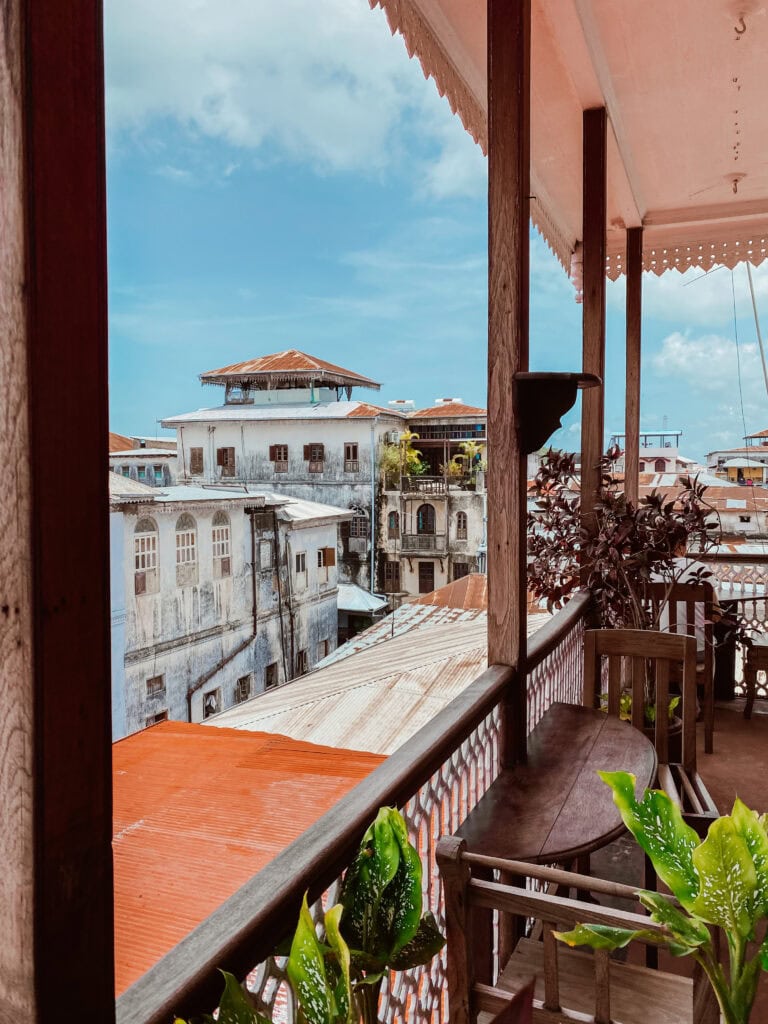
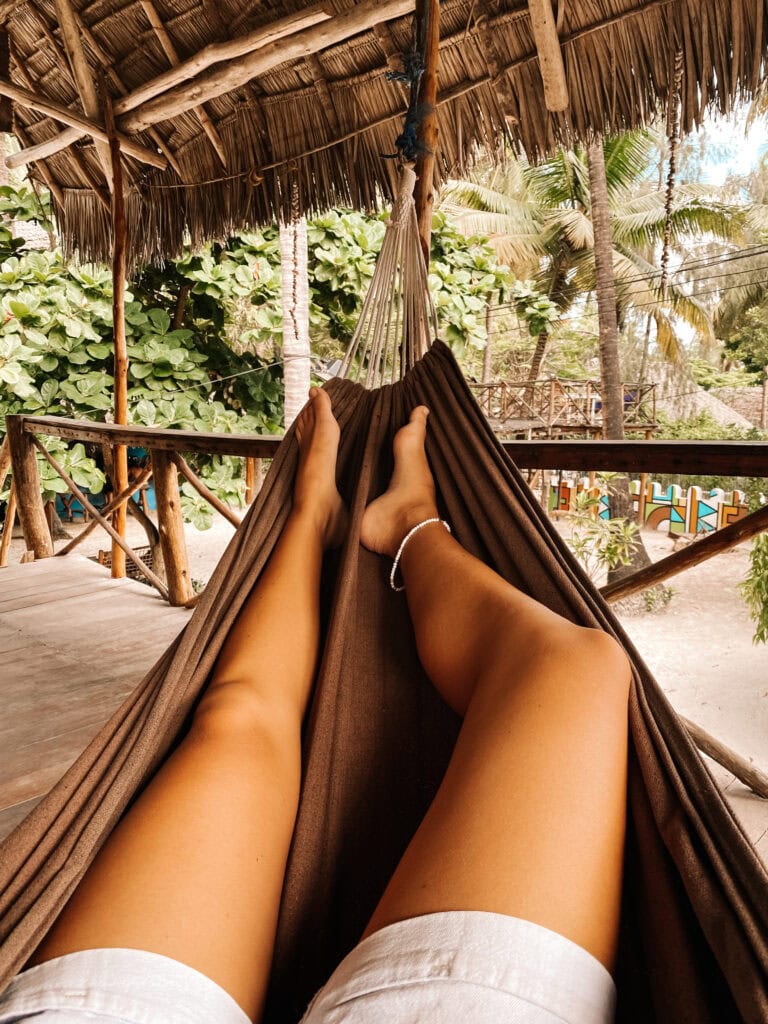
Zanzibar doesn’t have the same infrastructure that you’ll find in other parts of the world. That means it’s not uncommon for the power to go out for long stretches of time. It’s also challenging to find good wifi. So how can you get around this?
- Buy a SIM – As soon as you land, get a SIM card through Zantel or Vodacom. I’d recommend getting a large amount of data so you can hotspot when the wifi isn’t working. I personally got 37 gigs for $22 USD. This should last you the entire month but you can always top up if needed!
- Work from resorts – When you have an important call or work to get done, do so from a resort. They’ll have the strongest wifi and generators for when the power goes down.
- Work from restaurants/cafes – Since co-working spaces aren’t much of a thing in Zanzibar yet, restaurants or cafes will be your best bet for working on a daily basis. I found Paje to have the best options for places to work from.
Money in Zanzibar
The currency used in Zanzibar is the Tanzanian Shilling (TZS), but US dollars are widely accepted, especially in tourist areas.
Most accommodations, tours, and upscale restaurants quote prices in USD, so it’s useful to carry both currencies.
ATMs are available in Stone Town and major towns, but they may not be reliable in smaller areas. Always carry cash, as credit card facilities are limited and often come with a surcharge.
Exchange rates can vary, so it’s best to use official exchange offices or banks. When shopping in local markets, paying in Tanzanian Shillings is more convenient and budget-friendly.
What Languages Are Spoken in Zanzibar?
The official languages of Zanzibar are Swahili (Kiswahili) and English.
Swahili is the most widely spoken language, deeply rooted in the island’s rich cultural heritage and used in everyday communication.
English is commonly spoken in tourist areas, making it easy for visitors to navigate.
In addition, Arabic plays a significant role due to Zanzibar’s historical connections with the Arab world.
You might also hear Indian languages like Gujarati and Hindi within the local Indian community.
I highly recommend learning a few Swahili phrases, such as “Jambo” (hello) and “Asante” (thank you), as it goes a long way in connecting with locals!
Is Zanzibar Budget-Friendly?
This digital nomad guide to Zanzibar wouldn’t be complete if I didn’t fill you in on the budget! Most digital nomads are looking for a place that’s budget-friendly so they can afford to travel while working remotely and possibly save quite a bit of money at the same time.
Sure, you can live and travel around Zanzibar on a budget BUT it’s certainly not my top pick for a budget-friendly digital nomad destination.
Where to Work in Zanzibar
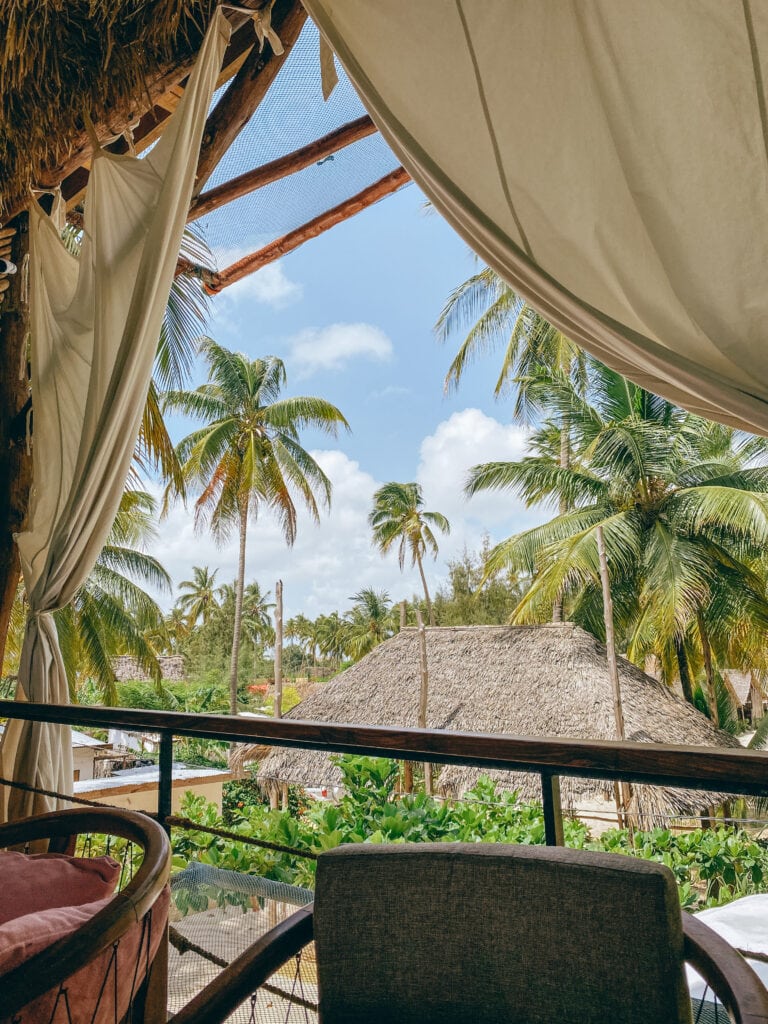
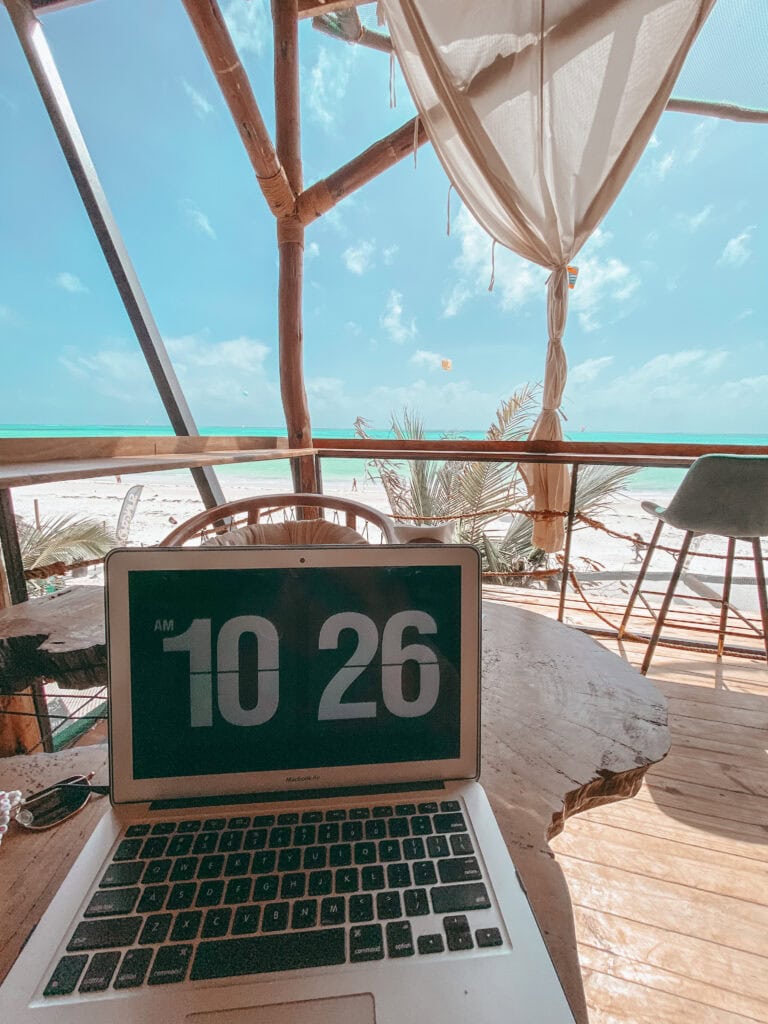
Finding a good spot to work in Zanzibar can be a bit of a challenge, depending on where on the island you are. The best place for digital nomads in Zanzibar is Stone Town.
Stone Town is a World Heritage Site that’s in Zanzibar City and is often the first stop for a trip to Zanzibar as the ferry terminal and airport are close by. There’s a lot to see and do in Stone Town when you’re not working but it doesn’t have the crystal clear water and stunning beaches you’ll find on other parts of the island.
Best Wifi in Stone Town:
Historic Stone Town, without a doubt, has the best working options for digital nomads in Zanzibar.
A few co-working spaces are starting to pop up, such as The Train’s House Co-Working Space but if you don’t want to pay a membership fee, you can find some restaurants with wifi. Your best is working from a resort’s restaurant or cafe.
If you want to work with a beautiful view of the city, Zanzibar Coffee House has free wifi for a limited time and then you might need to switch over to your hotspot.
Best Wifi in Paje:
Although Paje is known to be the party spot in Zanzibar, there are a few good spots to get work done! Mr. Kahawa (Swahili for Mr. Coffee), is by far the best place to work, in my opinion.
They have a good selection of food and drinks, the wifi is fast and there are many spots to charge your laptop!
I also spent some time working at The Nest but I found that their wifi wasn’t as reliable for remote work.
Otherwise, I’d check out some of the resorts along the beach if you’re on the hunt for good wifi in Paje!
Best Wifi in Nungwi:
I surprisingly struggled the most with finding good wifi in Nungwi.
It’s a very touristy spot so I expected the wifi would be better than it was. Resorts and/or hotels are really the only place you’ll find reliable wifi here.
Coworking Spaces in Zanzibar
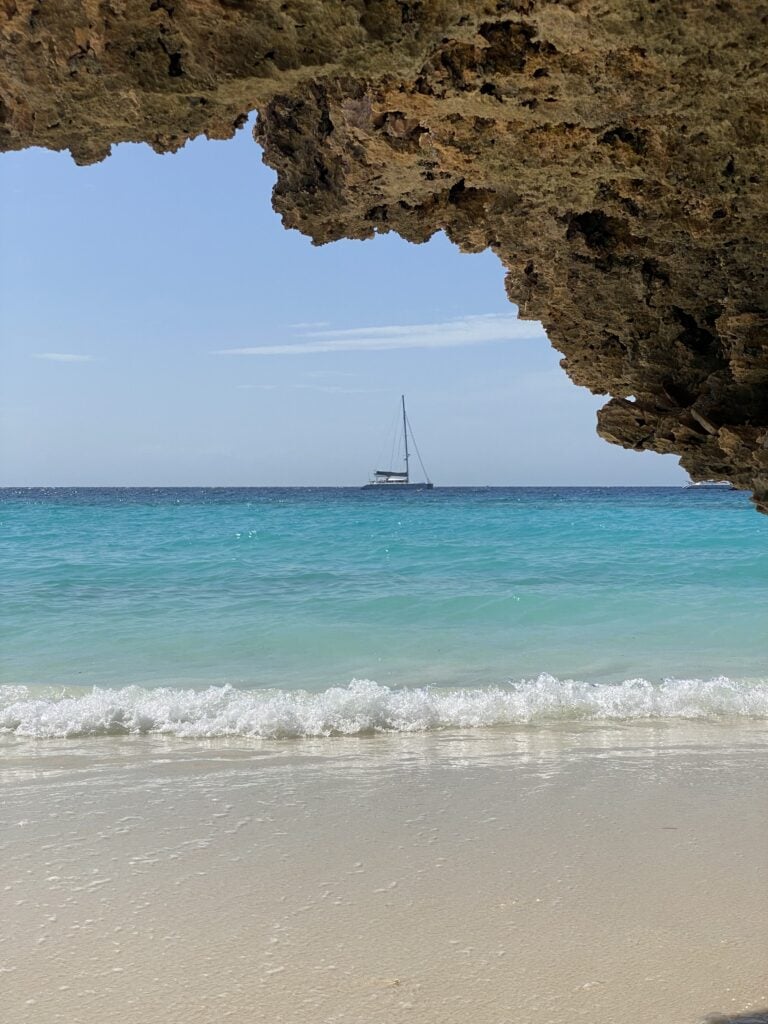
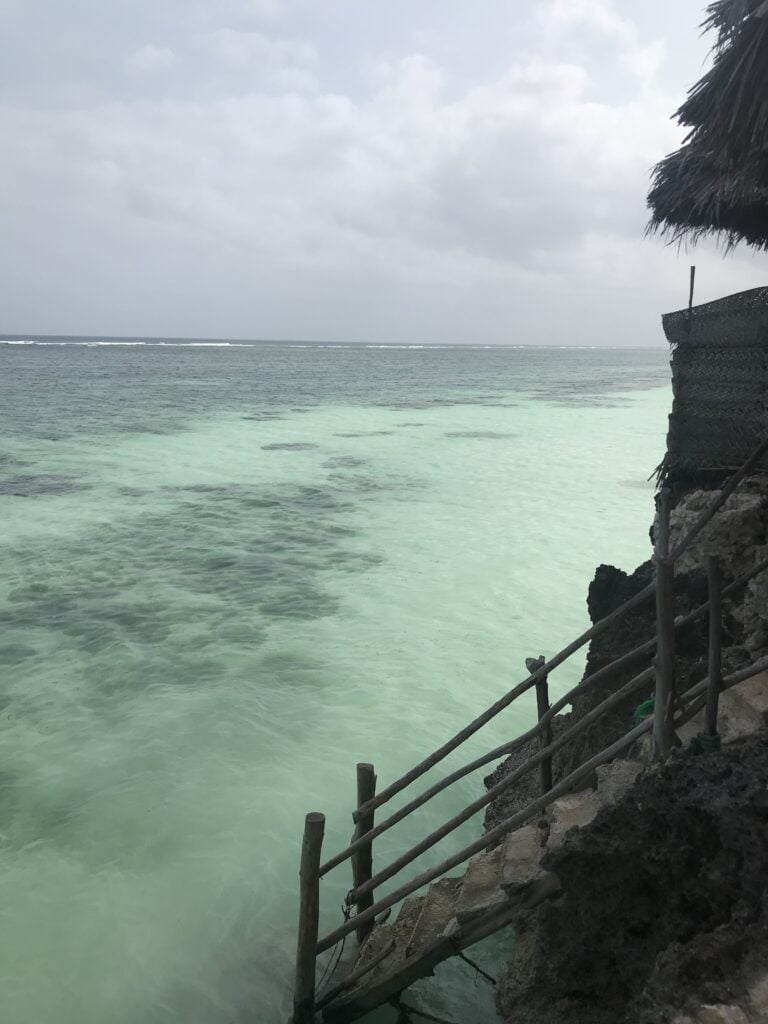
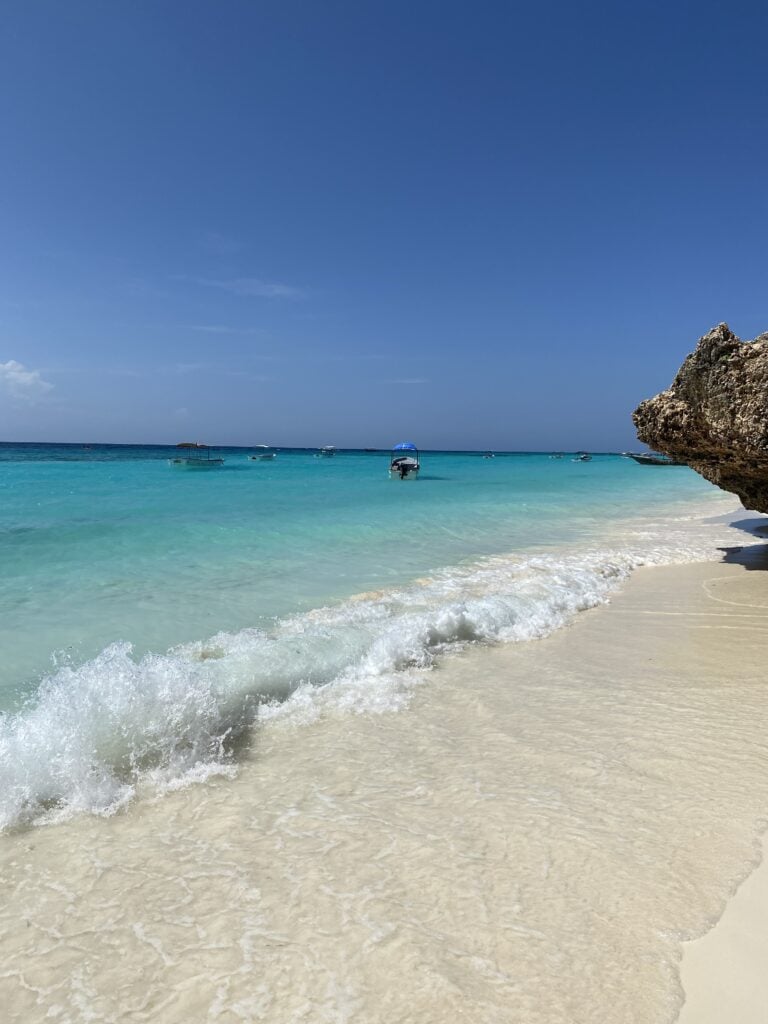
Zanzibar’s growing popularity among digital nomads has led to the emergence of coworking spaces catering to remote workers seeking a balance between productivity and paradise.
Here are some of the top coworking spots on the island:
1. The Nest Zanzibar
Located in Paje, The Nest is a popular coworking and coliving space designed for digital nomads. It offers fast Wi-Fi, ergonomic workstations, and a social atmosphere. Its beachfront location and proximity to local cafes which is perfect if you’re looking for good work-life balance!
2. Surf Escape Zanzibar
Situated in Paje, Surf Escape combines coworking and relaxation. This beachfront space features high-speed internet, cozy workstations, and stunning ocean views. It’s a favorite among kite surfers who want to alternate between catching waves and meeting deadlines.
3. Kipepeo Workspace
In Jambiani, Kipepeo Workspace offers a laid-back atmosphere with reliable Wi-Fi and a communal feel. The space is perfect for digital nomads looking to collaborate or unwind after a productive day.
Tips for Digital Nomads in Zanzibar
If you’re ready to make Zanzibar your next digital nomad destination, here are a few things to keep in mind:
- Keep your devices charged – Since you can never be too sure as to when the power will go out, it’s important you keep your devices fully charged. Bringing a power bank with you can help ensure you never run into a situation where your computer/phone dies when you’re in the middle of work and are unable to change it.
- Weather – Do you work well in 30+ degrees and humidity? It will be challenging to find air conditioning on the island (unless you’re staying at a resort), so that’s another thing to consider.
- Bugs – I don’t know about you but mosquitoes absolutely LOVE me. Unfortunately, I don’t exactly love them, so working in Zanzibar wasn’t super fun for me. You can find some pretty good bug spray/cream to put on in the evenings but they’re hard to avoid completely.
Best Countries in Africa for Digital Nomads
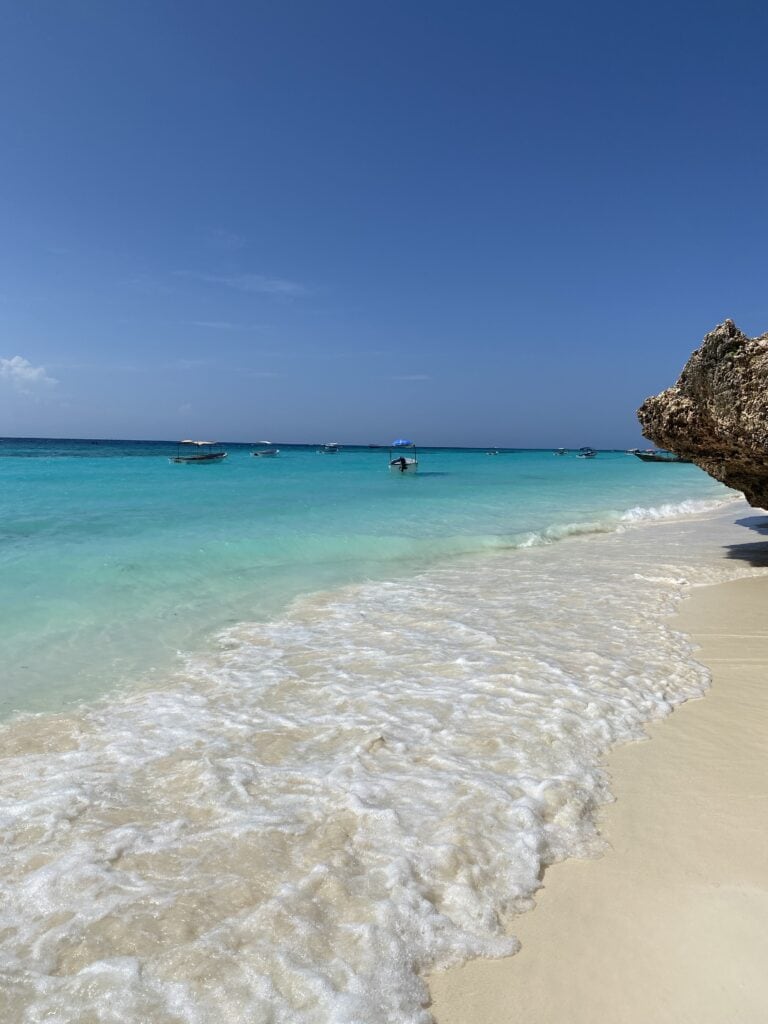
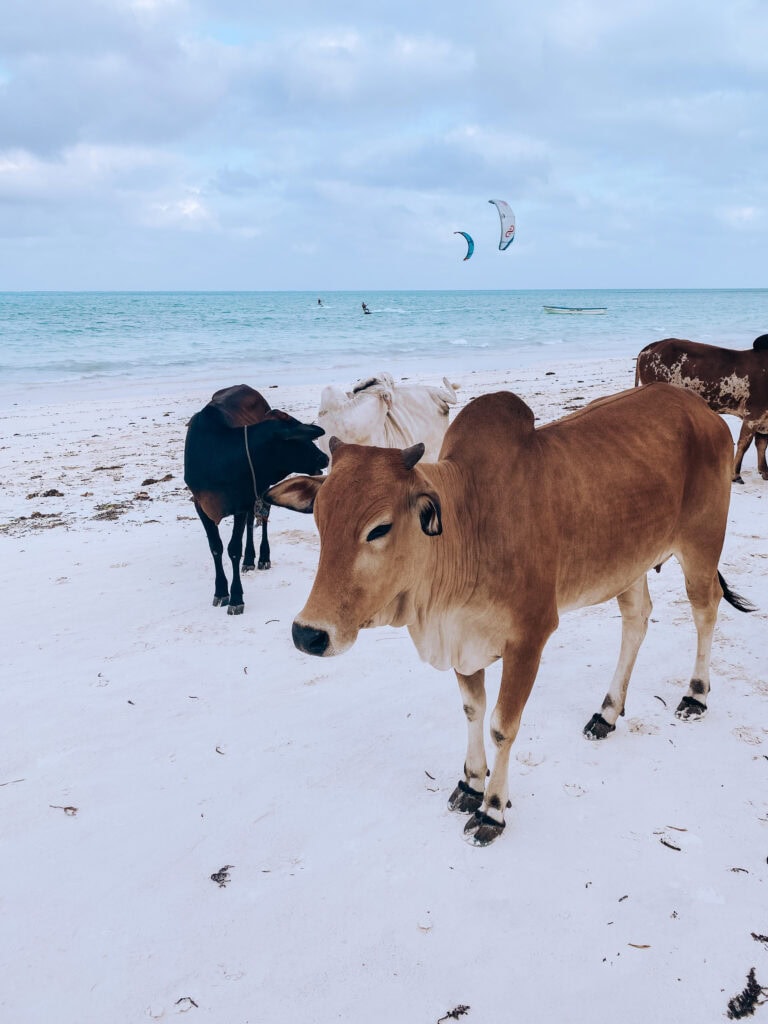
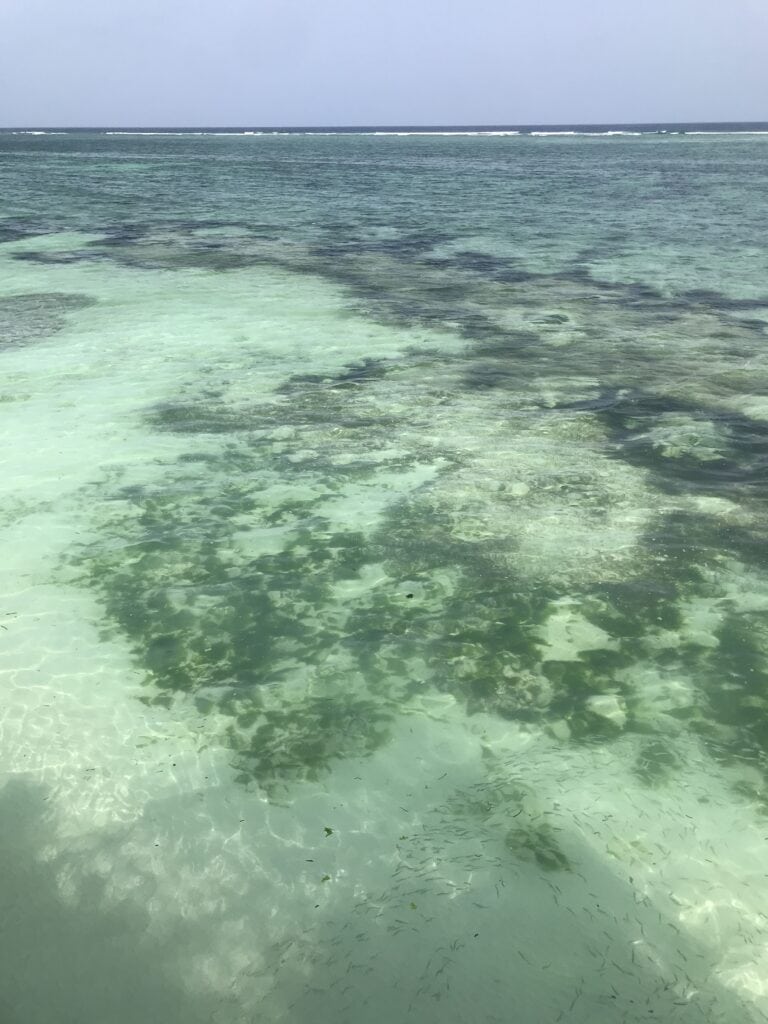
Not 100% sold on working remotely from Zanzibar?
No problem – here are some other great options in Africa!
South Africa
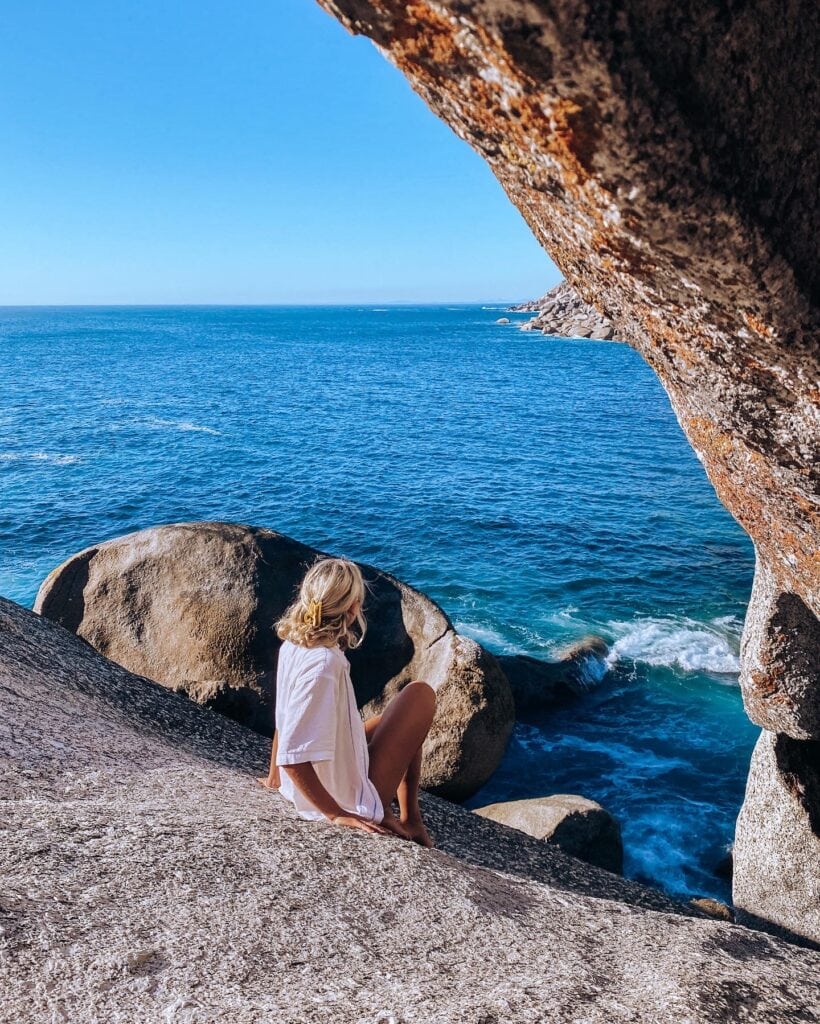
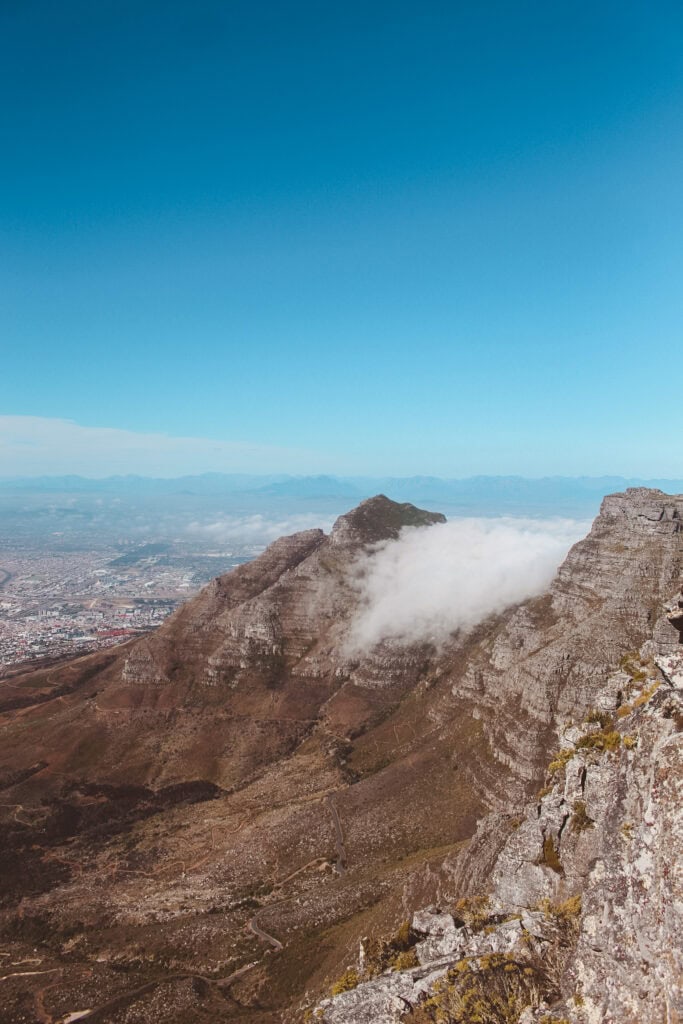
South Africa has many amazing spots to work remotely from!
If this is your first time stumbling upon my blog, you might not know that I’ve spent over 7 months working remotely from South Africa (it’s kinda my favourite country I’ve been to).
One of the most popular spots for digital nomads in Africa is Cape Town.
During my time there, I discovered some of the best cafes to work from, found ways to explore Cape Town and its surroundings on a budget and learned a lot about the various safety precautions to keep in mind when you’re in South Africa.
While Johannesburg is the capital of South Africa, it’s not nearly as popular as Cape Town for digital nomads because it’s not near the beach.
There are many other beach destinations in South Africa that digital nomads take advantage of but Cape Town is certainly the most popular due to how accessible and developed it is!
The internet is South Africa can be a little unreliable, depending on where you are. But with that said, in the past few years alone, I’ve seen a massive change in Cape Town.
Most cafes, restaurants, hostels and hotels will have a generator for those working. South Africa frequently deals with load shedding (which is when the power cuts for hours at a team each day) but load shedding hasn’t been a problem for remote workers in the past few years!
Namibia
While I haven’t experienced Namibia just yet, I know it’s a hot spot for remote workers in Africa.
Namibia, with its dramatic landscapes and unique wildlife, is an emerging destination for remote workers seeking a blend of adventure and tranquility.
And although it may not yet have a robust digital nomad infrastructure, the country offers unique opportunities for those who can adapt to its slower pace of life.
Major towns like Windhoek and Swakopmund have reliable Wi-Fi in cafes, coworking spaces, and accommodations. Mobile networks are decent in urban areas but can be spotty in remote locations, so investing in a local SIM card from providers like MTC is essential.
Living expenses are moderate, with monthly accommodation costs ranging from $400 for shared housing to $1,000+ for private apartments in cities.
Namibia’s natural beauty is a significant draw. From the dunes of Sossusvlei to the wildlife of Etosha National Park, there’s no shortage of incredible experiences to enjoy during your downtime. With its safe environment and welcoming locals, Namibia offers a unique remote working experience.
However, due to limited coworking spaces, it’s best suited for self-reliant workers who thrive in less structured environments.
Morocco
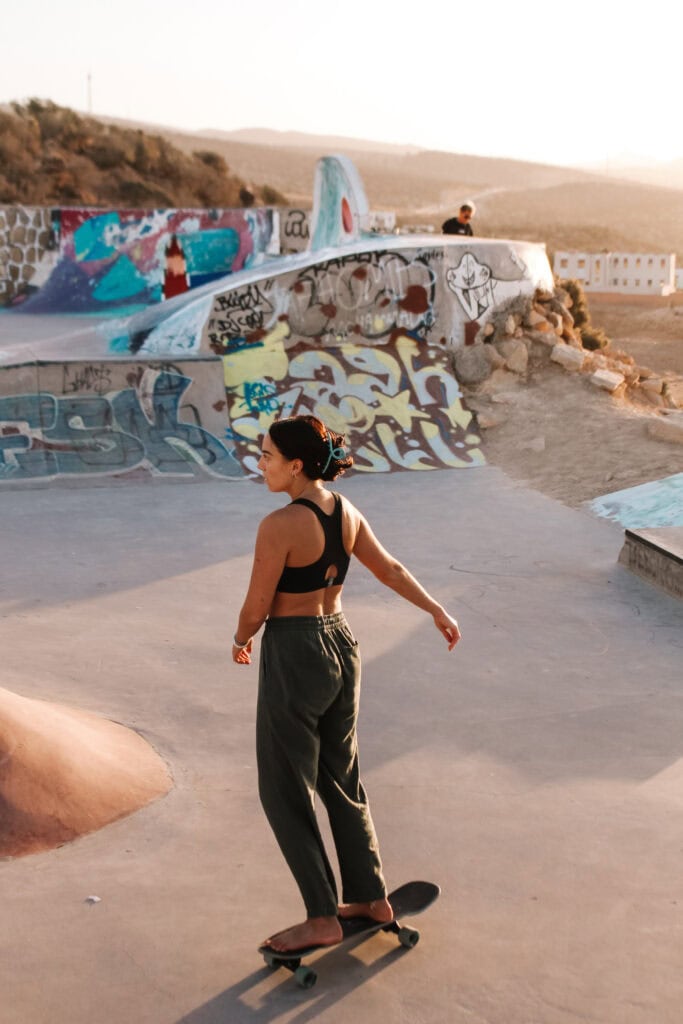
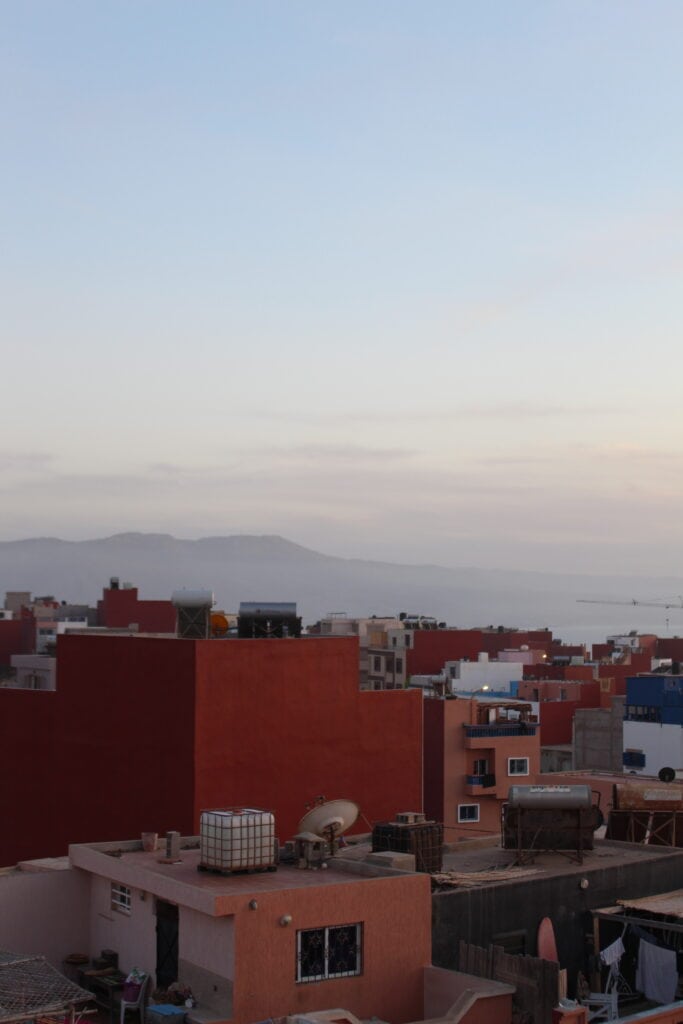
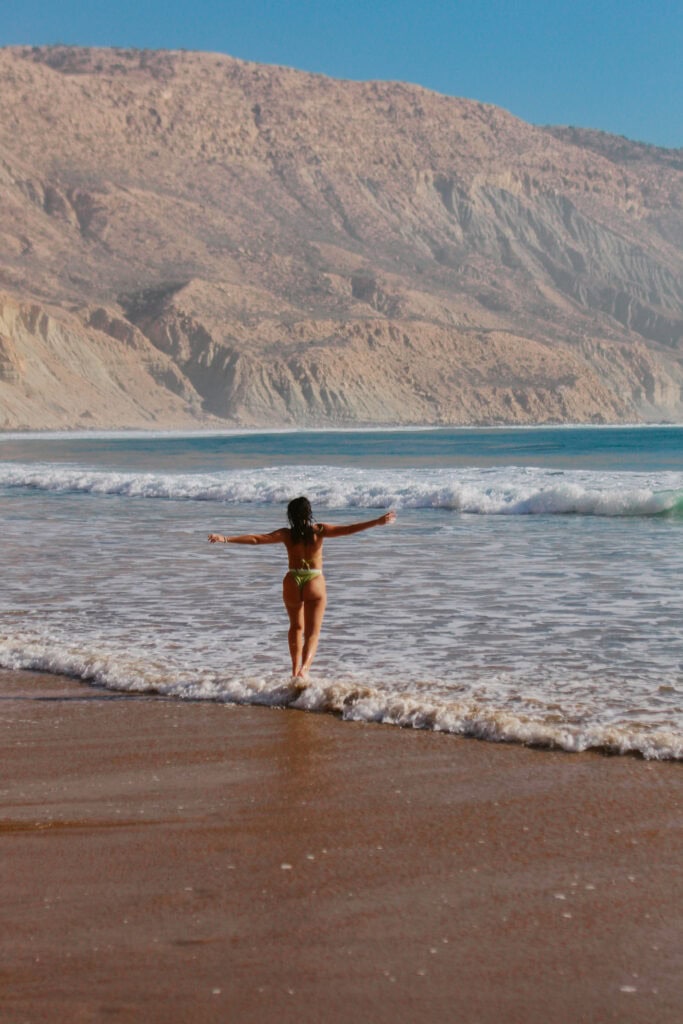
Morocco is another country I’ve spent a lot of time exploring over the past few years.
It’s quickly becoming more and more popular amongst digital nomads, especially those in Europe, hoping to escape the cold winter weather. Flights from Europe to Morocco are SUPER affordable with budget airlines, making it one of the most accessible parts of Africa from which to work remotely.
Morocco is often known to be quite conservative, which could be a concern for remote workers, however, I’ve found that the cities along the coast are much less conservative than places like Marrakesh.
See my packing list for Morocco here.
Major cities like Marrakech, Casablanca, and Tangier have reliable Wi-Fi, coworking spaces, and modern amenities.
The cost of living is budget-friendly, with monthly rents starting at $300 for shared apartments.
Traditional Moroccan cuisine, local markets, and stunning landscapes, from the Sahara Desert to the Atlas Mountains, provide endless inspiration.
While urban areas are well-equipped for remote work, I highly recommend quieter towns like Essaouira or Taghazout which offer a relaxed atmosphere. With a rich cultural heritage and warm hospitality, Morocco is a unique base for digital nomads seeking adventure!
Egypt

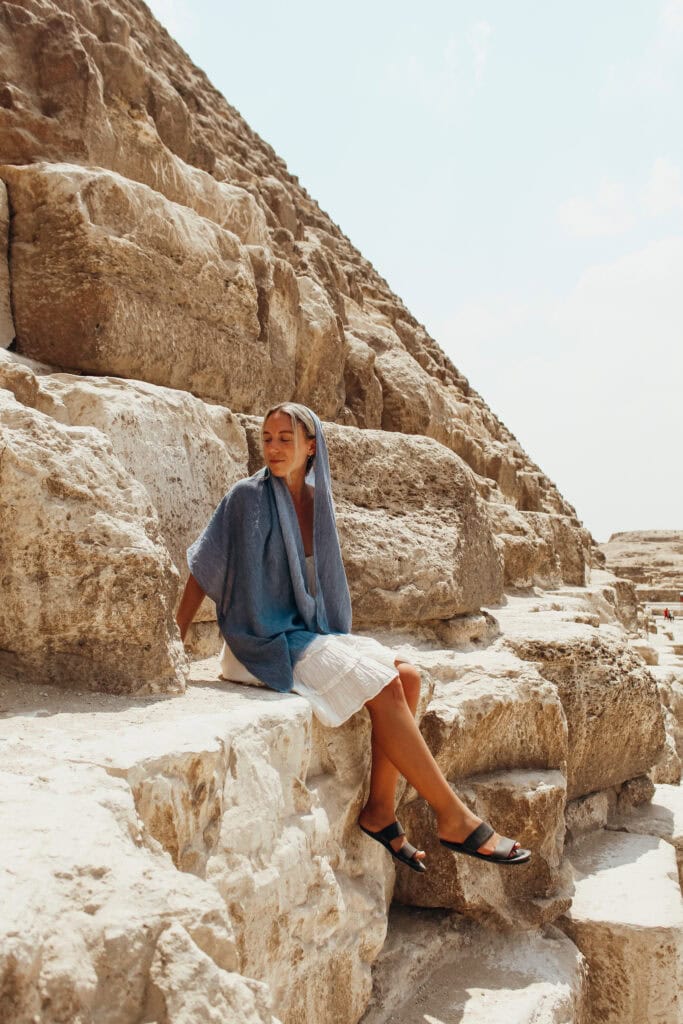
Although I’ve only spent a couple of days exploring Egypt (mostly around Cairo), I know that Egypt is quickly becoming a popular spot for digital nomads.
I wouldn’t recommend Cairo as a good place for remote workers, however, Dahab might be a good spot to consider working from if you want a chill beach destination.
Unfortunately, I haven’t been able to go back to Egypt and see Dahab for myself yet because of entrance restrictions for Canadian citizens. A tourist visa is now required for Canadians entering Egypt and can only be obtained from certain embassies in Canada.
Dahab, a laid-back coastal town in Egypt’s Sinai Peninsula, has become a popular destination for digital nomads seeking a peaceful work-life balance.
Known for its stunning beaches, crystal-clear waters, and vibrant diving scene, Dahab offers a unique remote work experience. The town has several cafes and coworking spaces with reliable Wi-Fi, though internet speeds may vary.
The cost of living is extremely affordable, with accommodation starting at around $200 per month. Dahab’s relaxed atmosphere and friendly expat community make it an ideal place to combine work with outdoor activities like hiking, snorkelling, and windsurfing!
Things to Do in Zanzibar
- Kite Surfing – Zanzibar’s coastline, particularly in Paje, is a hotspot for kite surfing. With consistent winds and warm waters, it’s perfect for both beginners and experienced kite surfers. Local schools offer lessons and equipment rental, making it an exciting way to explore the Indian Ocean.
- Diving & Snorkelling – The crystal-clear waters around Zanzibar boast vibrant coral reefs and diverse marine life. Popular dive sites include Mnemba Atoll and the Zanzibar Channel, where you can see colorful fish, turtles, and even dolphins. Snorkelling trips also offer an easy way to enjoy Zanzibar’s underwater world.
- Spice Tour – Zanzibar is known as the “Spice Island,” and a spice tour is a must-do to learn about the island’s rich agricultural history. Visit spice farms to smell, taste, and see the cultivation of cloves, cinnamon, nutmeg, and more. It’s an interactive experience that highlights Zanzibar’s cultural heritage.
- Island Hopping – Take a boat trip to nearby islands like Changuu Island, home to giant tortoises, or explore the pristine beaches of Mnemba Island.
- Darajani Market – In Stone Town, visit Darajani Market for a sensory overload of fresh produce, spices, and local crafts.
- Kuza Caves – Explore the Kuza Caves in Jambiani, where you can swim in natural freshwater pools surrounded by lush greenery.
Is Zanzibar Safe? Zanzibar Safety Concerns
Zanzibar is generally considered safe for travellers, with low crime rates, especially in tourist areas.
However, like any destination, it’s important to stay vigilant, avoid walking alone at night, and keep valuables secure.
I felt fairly safe most of the time I was in Zanzibar. The one time I didn’t feel great was on the ferry from Dar es Salaam and a local man wouldn’t leave me alone and I had taxi drivers surround me when I got off the ferry.
Do You Need a Visa to Work in Zanzibar?
To work in Zanzibar, you’ll need a work permit, which is separate from a tourist visa. With that said, most people enter for a short stays to work remotely on a tourist visa.
A tourist visa allows for stays of up to 30 days and costs around $50. Extensions are possible, but working without a permit can lead to fines or deportation.
Always check current visa requirements before travelling!
Do I Need to Dress Conservatively in Zanzibar?
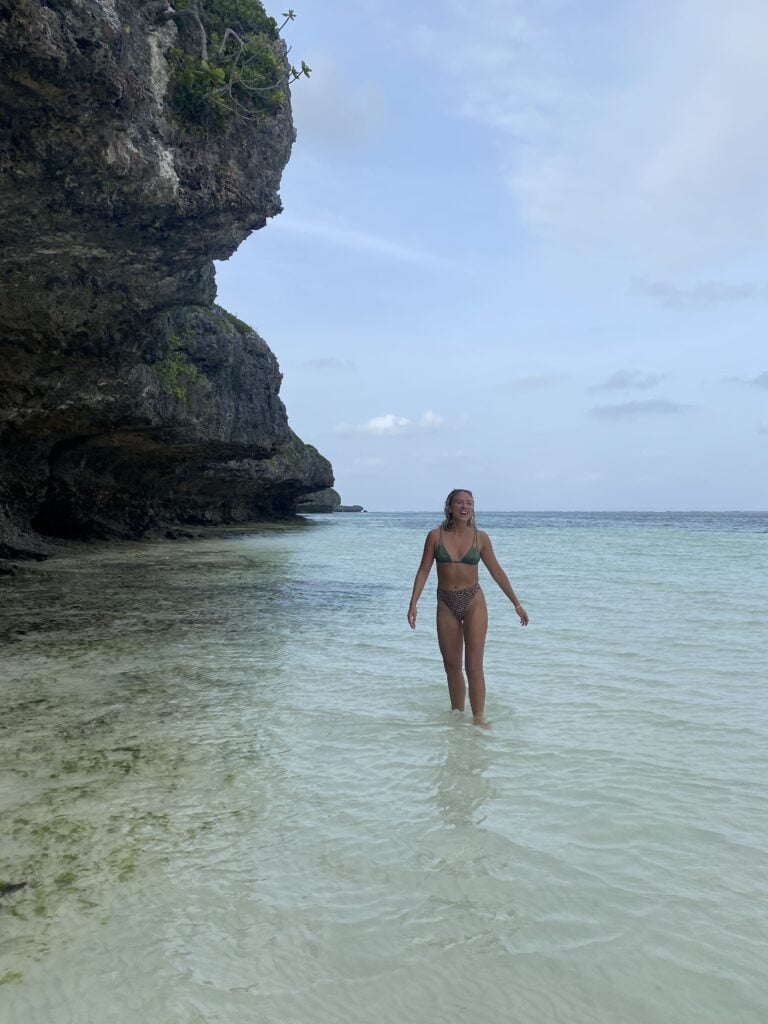

In Zanzibar, dressing conservatively is important to respect the local culture and its rich cultural heritage.
While tourists are free to wear casual attire, it’s recommended to cover shoulders and knees when visiting local villages, mosques, or cultural sites.
I had no issues wearing my bikini and summer outfits when I was in Paje or Nungwi but definitely covered up more when I was in Stone Town, as there were more locals around!
What’s Zanzibar’s Nightlife Like?
Zanzibar’s nightlife is relaxed yet lively, with a mix of beach bars, lively clubs, and laid-back lounges.
Stone Town offers cultural experiences with music and dance, while areas like Nungwi and Paje feature beachfront parties and sunset cocktails.
There were also lots of beach parties that happened when I was staying in Paje that were pretty relaxed but could go all night if you wanted to!
What’s the Food in Zanzibar Like?
Zanzibar’s food is a fusion of African, Arab, Indian, and European influences.
Popular dishes include spicy seafood, grilled meats, biryani, and the island’s famous Zanzibar pizza.
Fresh tropical fruits like mango, coconut, and bananas are abundant, and street food vendors offer snacks such as samosas and mishkaki.
As a vegan, I couldn’t try many of the traditional dishes but had no trouble finding options to eat!
Don’t Forget Travel Insurance!
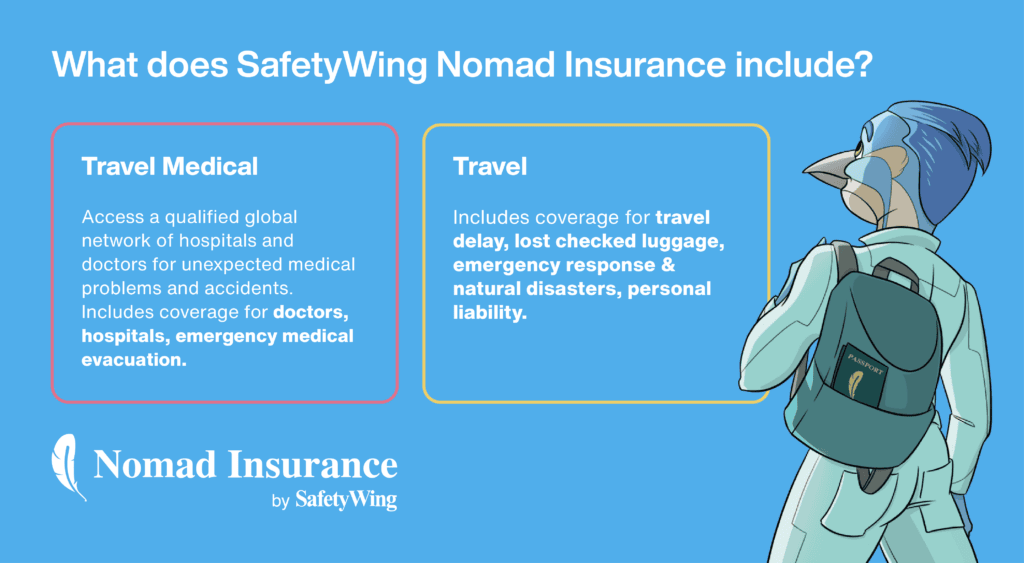
Travel insurance is an absolute MUST if you’re planning on visiting Zanzibar!
I’ve been using SafetyWing for years now and actually started using them when I was in Zanzibar in 2022.
Check out their plans and make sure you’re covered before your next trip.
Is it worth it?
To be completely honest, I wasn’t 100% sold on Zanzibar for digital nomads. With the temperature staying at around 30 degrees Celsius throughout the entire day (AND night), I found it incredibly hard to focus on work.
While there are certainly other people working remotely, it doesn’t have much of a digital nomad community and most people still go to Zanzibar for a quick island vacation.
I think there are MUCH better options for remote work in Africa that I listed and would rather spend more time there than in Zanzibar. With that said, it’s a stunning island worth seeing for a short stay!
That’s a wrap on this digital nomad guide to Zanzibar. If you want more Zanzibar content, head over to my TikTok, Instagram and YouTube and I’ll see you shortly with a new blog.
Cheers,
Amy xx
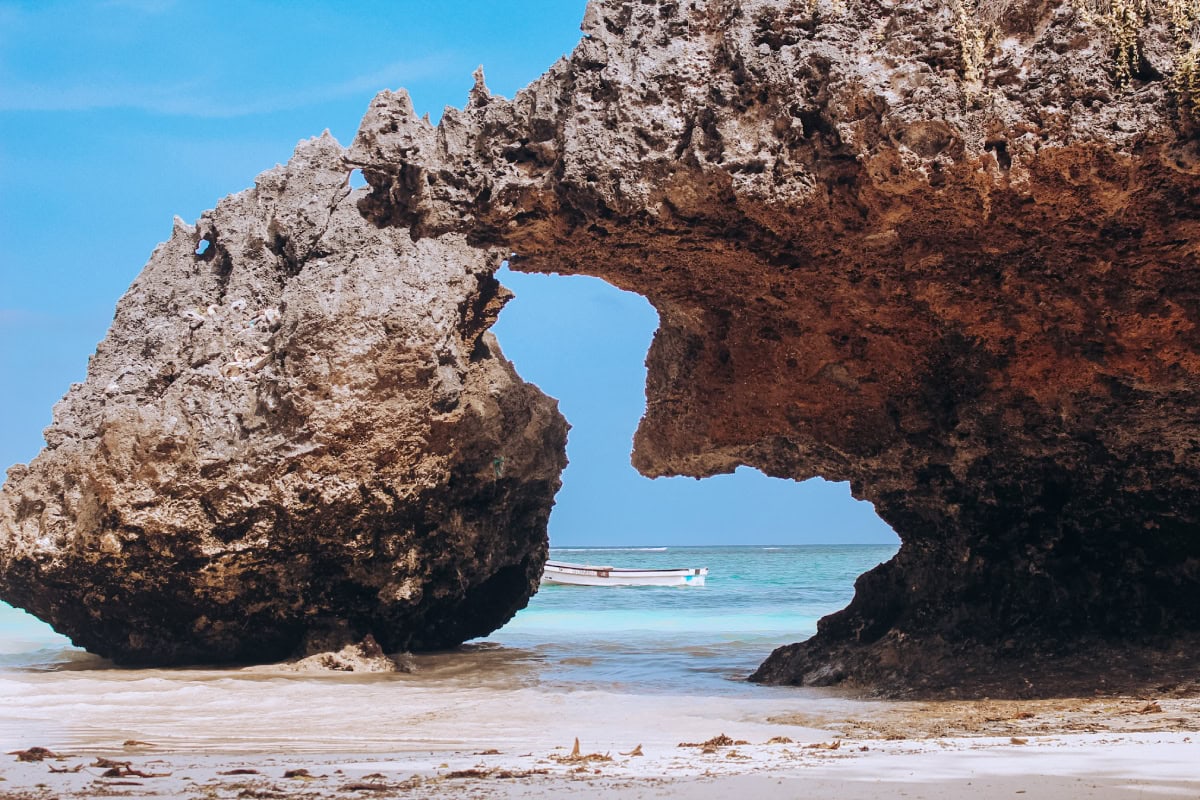
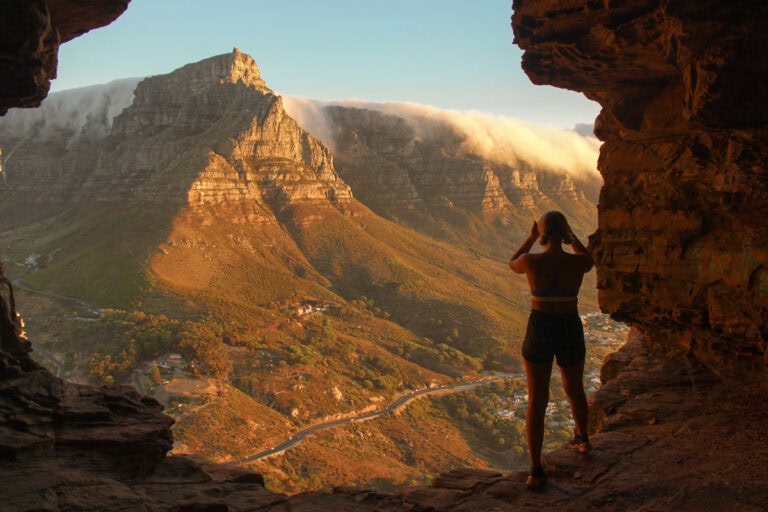

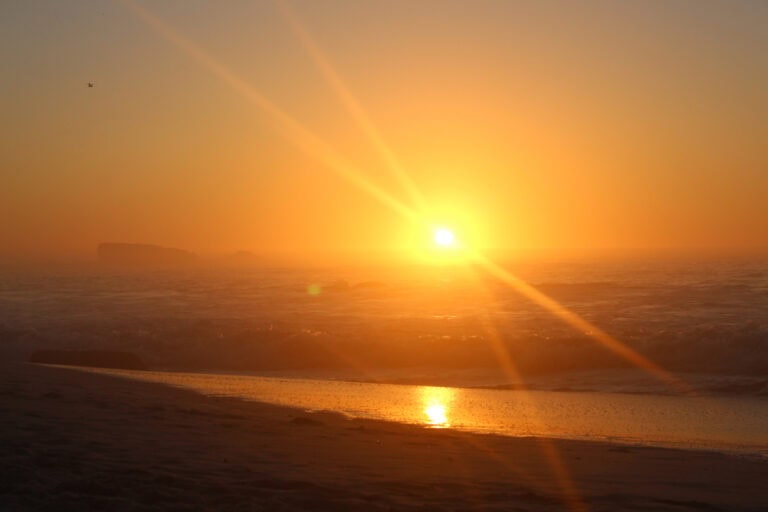
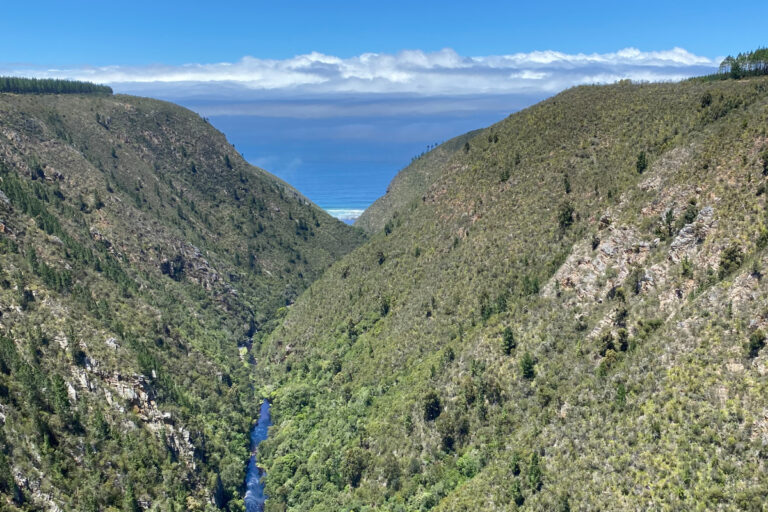
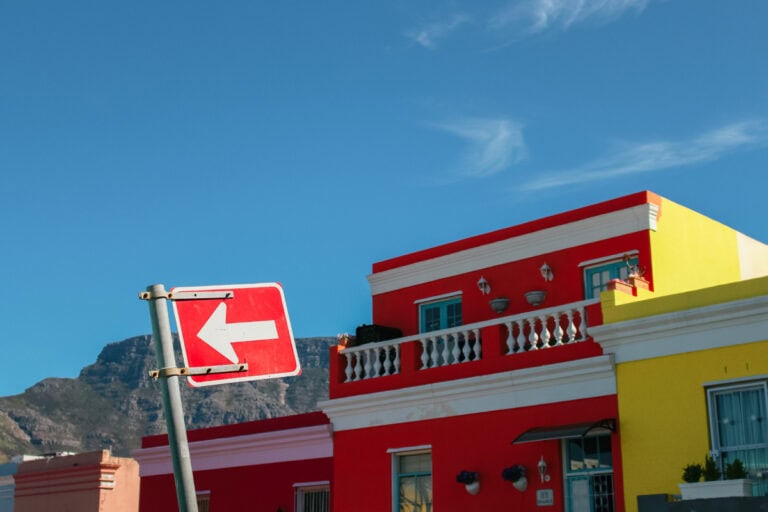
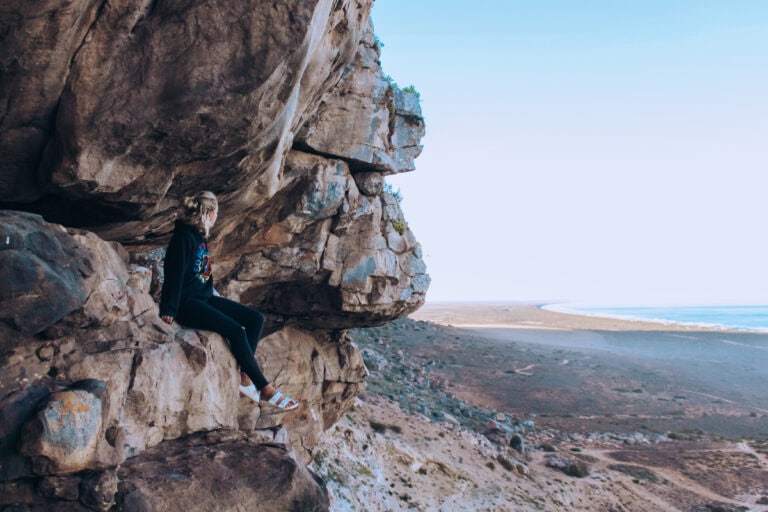
This is an interesting article.
Thanks for your comment! What other topics would you be interested in reading about?
Hi Amy,
do you have any recommendation for a Hostel in Zanzibar?
Thanks! 🙂
I can’t remember the name of the hostel I stayed at in Paje but it was right next to the beach – about 2 min walk! It wasn’t the best but there are a few others in the same area.
Thanks for this. I’m heading to Zanzibar and I was a bit concerned about WiFi and work. I will be in a resort in Nungwi so I guess that’s sorted.
i hope you enjoy your time there and I’m glad you found this helpful!
That’s very helpful. Thanks!
I’m planning to stay in Zanzibar for 2 months, Jan and Feb/2024. I’ll probably rent an Airbnb with air conditioning and Wi-Fi, and will also get the SIM as you suggested. I’m going mostly for the Kitesurf. Paje is a famous kite spot.
Let’s see if it works out ðŸ˜
Glad you found it helpful! Airbnb might be the way to go. And Paje is a good spot for kitesurfing for sure 👌ðŸ¼
Thanks! That was very helpful!
I’m planning on staying in Zanzibar for 2 month, Jan and Feb 2024. If it works out, I’ll stay in an Airbnb with ar conditioning and Wi-Fi, I’ll also get a SIM card, as you suggested.
I’m going mostly for the Kitesurf. Paje is a famous kite spot.
Let’s see if it works out ðŸ˜